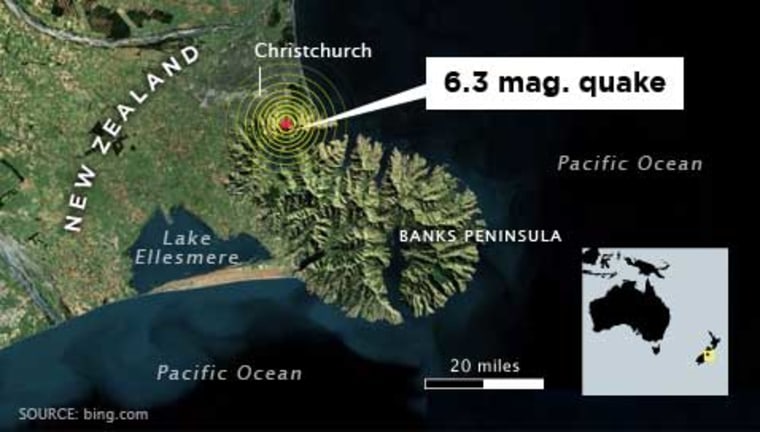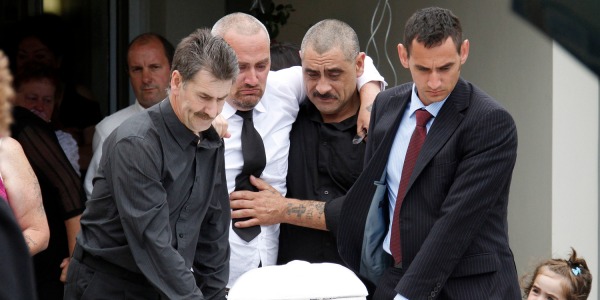At the epicenter, children in the school playground screamed as the earth rattled and cracked. Elderly residents toppled to the floor in the nursing home. Cliff faces fell, spitting truck-sized boulders across lawns and through houses.
This week's massive earthquake flattened office towers and killed more than 110 people in nearby Christchurch. But this tiny harborside village reported no deaths despite being ground zero.
Residents are thankful for that. But there is devastation all around them.
"I thought the devil was coming up out of the earth," said Kevin Fitzgerald, a 63-year-old teacher's aide who yanked a student under a desk and sheltered him as the school rocked menacingly, sending everything crashing to the floor.
"The whole building was just undulating — that noise, that NOISE!" he said Thursday, shaking his head at the memory. "I thought, 'Well, I'm going to die.'"
The rumbling started at 12:51 p.m. Tuesday. When it stopped, Fitzgerald ran to join the students on the school's playground, most of whom were sobbing hysterically. He saw a giant, mushroom-shaped cloud of dust hovering over the town. The community's usual hum was replaced by silence, punctuated by screams, dog barks and seagull calls.
Two days later, dazed residents of the village of 3,000 wandered through dusty, brick- and glass-covered streets, pausing when they passed each other to offer hugs, shed a few tears and ask the question on everyone's mind: "How's your house?"
The answer was generally grim. Most homes bore at least some quake-induced scars. The popular Ground deli was in ruins, windows were blown out of shop fronts, and the stone steeple on the Union Parish Church had toppled to the ground.

Though there was a report of one man crushed by a boulder, so far there are no confirmed deaths in Lyttelton.
Christchurch Police said Friday that at least 113 bodies had been pulled from the rubble, and 228 people were listed as missing in what could end up New Zealand's worst natural disaster.
Police said dozens of bodies may still lie trapped in the tangled concrete and steel that was the Canterbury Television building, where dozens of students from Japan, Thailand, China and other Asian countries were believed buried when an English-language school collapsed along with other offices. Twenty-three bodies were pulled from the building Thursday.
"The longer I don't know what happened, the longer my agony becomes," said Rolando Cabunilas, 34, a steel worker from the Philippines whose wife, Ivy Jane, 33, was on her second day of class at the school when the quake struck. She hasn't been heard from since.
"I can't describe it — it's pain, anger, all emotions," he said.
"It's a dreadful, dreadful day, it's a hard day for the search and rescue people because everybody is full of hope we can find people in the rubble," said Christchurch Mayor Bob Parker as rescue teams failed to find any sign of life.
"Frankly it looks like a war zone from a helicopter," Prime Minister John Key said. "It's building after building after building that's collapsed."
More than 100 aftershocks have brought down more debris. Roads have buckled and large pools of water have welled up from broken pipes and sewers.
In places, roads had collapsed into a milky, sand-colored lake beneath the surface, the result of Christchurch's sandy foundations mixing with subterranean water under the force of the quake. Officials call it "liquefaction" of the ground.
Tuesday's quake was the second major temblor to strike the city in the past five months.
It was less powerful than the 7.1 temblor that struck before dawn on Sept. 4, damaging buildings but killing no one. Experts said Tuesday's quake was deadlier because it was closer to the city and because more people were about.
As in Christchurch, water supplies to Lyttelton were cut, and residents gathered Thursday at a fresh water station set up near the town center, filling as many watering cans, plastic buckets and bottles as they could carry home. The pavement under their feet wobbled during relentless aftershocks, but residents said they were nothing compared with Tuesday's nightmare.
Lloyd Millar, 50, was walking up one of the community's steep hills when he felt the road shift under his feet.
"It was like standing on a swinging bridge and somebody on the end jumping up and down," he said.
Millar was filling buckets with water to haul back to his restaurant, which was covered in a greasy layer of spilled oil and sauce. His house was a wreck. The driveway had been lifted from the ground and slid downward and the brick walls crumbled in places, exposing foundation and wires.
Jean Smith's eyes filled with tears as she recalled the dread she felt Tuesday when the road beneath her car began to tilt. The 64-year-old clutched the steering wheel as the vehicle was thrown back and forth across the street.
"NO! NO! NO!" she screamed as a church crumbled in front of her and shrieking children streamed from the school across the road.
The giant boulders and massive piles of rubble that littered the streets turned her normally five-minute drive home into a six-hour journey from hell. When she finally arrived, her heart sank — the house was a mess, and husband Tom was nowhere to be found.
Slideshow 66 photos
6.3 quake rocks New Zealand city
The home they'd built together nearly 40 years ago had shifted several inches off its foundation, and parts of the outer wall had collapsed, exposing pink insulation. Her precious crystal had tumbled out of a living room cabinet and shattered. A beloved antique clock that belonged to her mother was smashed, and a toppled bottle of sambuca left a sticky mess on a blue carpet.
She sat on a dining room chair and sobbed. Tom arrived minutes later and they clutched each other. "I'm glad you're safe," she told him. "They're only breakable things."
Nearby, Jackie Crawford, 66, ran to check on her 89-year-old mother, Shirley Smith, at the Lyttelton nursing home. When she arrived, elderly patients were sprawled across the floor, and TVs had tumbled from their stands. She and staff members rushed to help the residents to their feet.
"Everyone was in shock, looking stunned," she said.
Miraculously, she found her mother safe in her room, bustling around — and proudly pointing out the vase of flowers she'd managed to grab before it crashed to the floor.
The quake unleashed huge boulders from surrounding hills, sending them hurtling toward the village. One monstrous rock, around 16 feet wide and 10 feet tall, bounced twice as it crossed a main road, gouging deep holes in the pavement, then rocketed into the front yard of a one-story white brick home. The boulder smashed into the front door and exited out the back — taking out everything in between.
Despite the devastation, few here said they would consider leaving. They would shake it off, clean up and move on with their lives.
On Thursday, Jean Smith stood in her shattered living room staring out at the turquoise harbor, a sea-filled crater from an ancient volcanic eruption that serves as the main deep-water port for the Christchurch region.
"We're going to rebuild, but it's going to take a long time," she said. "A long, long time."
Outside, another aftershock rattled the earth. Inside, Tom and Jean continued to pick up the pieces.
